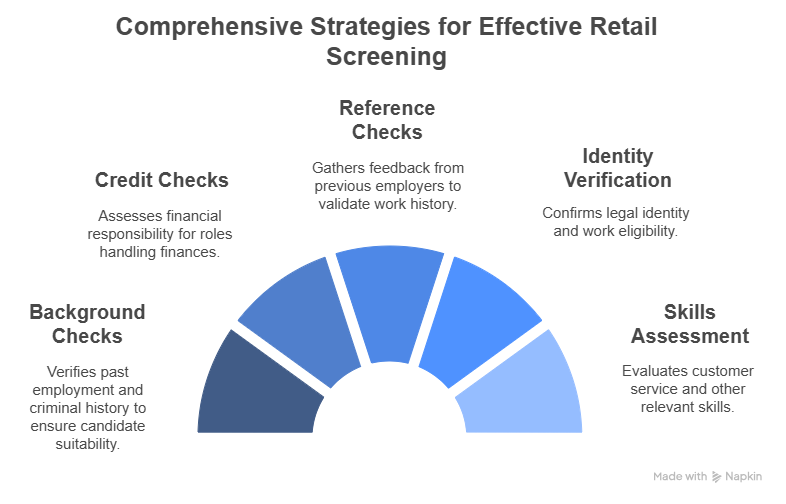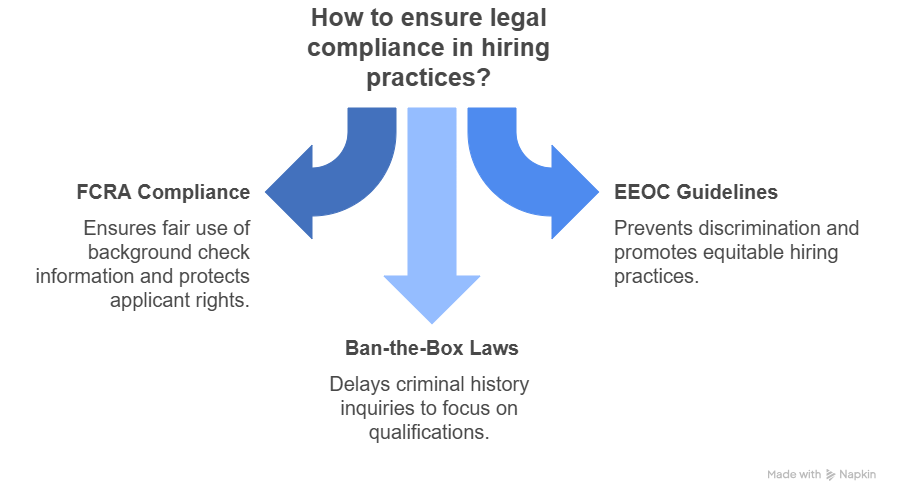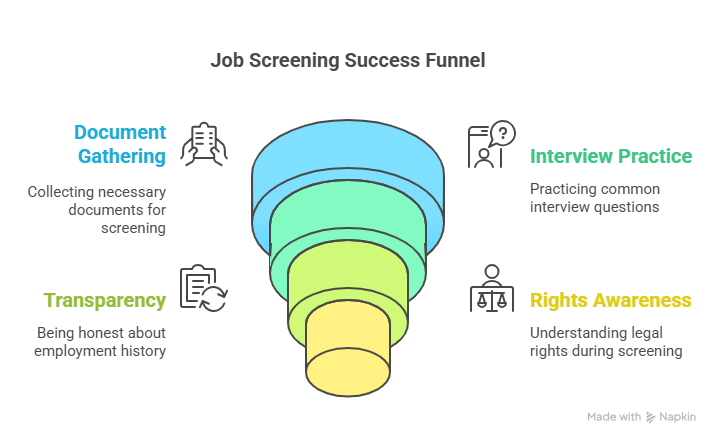The retail industry is a fast-paced, customer-centric sector where the quality of your workforce directly impacts your business success. Effective screening processes help ensure that you hire reliable, trustworthy employees who contribute positively to your business and maintain a safe environment for customers. This comprehensive guide delves into the key components of retail industry screening, providing valuable insights for business owners, HR professionals, recruiters, and job seekers.
Key Takeaways
- Effective screening in the retail industry is critical for enhancing customer safety, ensuring employee reliability, and securing financial assets.
- Various types of retail screenings—such as background checks, identity verification, employment verification, drug testing, and skills assessment—are essential for a comprehensive evaluation of candidates.
- Adhering to best practices, including consistency, clear policies, legal compliance, and careful vendor selection, ensures a thorough and fair screening process.
- Legal frameworks like the Fair Credit Reporting Act (FCRA), Equal Employment Opportunity Commission (EEOC) guidelines, and Ban-the-Box laws are vital for maintaining compliance and fairness in hiring.
- Challenges like high turnover rates, seasonal hiring demands, and large volumes of applicants can be mitigated through efficient, technology-enabled screening processes that maintain hiring quality.
Introduction
In the retail world, the quality of your workforce often determines your success. Effective screening processes are not just a formality but a necessity. They ensure you hire reliable, trustworthy employees who genuinely contribute to your business and customer safety.
Retail screening's primary goals are clear—enhancing customer safety, ensuring employee reliability, and reducing turnover. When done right, it's a win-win: you build a strong team, and your customers enjoy a safe, seamless shopping experience.
This guide will unpack the various aspects of retail industry screening. From different types of background checks to best practices and legal considerations, we aim to equip business owners, HR teams, recruiters, and job seekers with the knowledge they need to make informed decisions. Let's dive in.

Importance of Retail Industry Screening
Screening in the retail industry is more than just a box-checking exercise—it's the cornerstone of a strong, secure business. Let's break down why it's so crucial.
EXPERT INSIGHT: You're not only hiring in retail, in reality, you're recruiting those individuals who are going to define every person's experience and guard the heart of your brand. After decades working in frontline, customer-facing businesses such as retail, one thing is certain: your people become your store. Screening may look like paperwork to some, but to us in the trenches, it's trust, it's safety, it's consistency. Behind every résumé is a human being, and attracting the right ones to join the fold is finding that sweet spot between empathy and due diligence. Because when you bring in the right ones, you're not filling shifts—you're creating workplace culture that's safe, that's reliable, that's worth coming back to. - Charm Paz, CHRP
Customer Safety
A primary concern in any retail setting is the safety of your customers. Thorough screening helps ensure that individuals with a history of violent behavior or theft are not brought into the workplace, fostering a safer environment. When customers feel safe, they're more likely to return, and that loyalty is invaluable.
Employee Reliability
Your staff is often the face of your business. Hiring reliable and competent individuals who align with your company values can significantly impact your store's reputation. A rigorous screening process filters out potential hires who may not meet the standard, ensuring that only the most dependable and proficient candidates cut.
Financial Security
Retail businesses are especially vulnerable to internal theft and fraud. By conducting comprehensive background checks, you can mitigate these risks. Screening can reveal past financial misdemeanors or fraudulent activities, providing you with the information needed to make informed hiring decisions. This step not only safeguards your finances but also upholds the integrity of your operation.
In essence, investing in a robust screening process pays off in spades, enhancing customer safety, ensuring employee reliability, and securing your financial assets.
Types of Retail Screening
Effective screening in the retail industry isn't a one-size-fits-all approach; it involves multiple layers of verification to create a comprehensive view of each candidate. Here's a breakdown of the crucial types of retail screening:
Background Checks
Criminal Record Check
Running a criminal record check helps ensure candidates don't have a history that could pose a risk to customers or the business. It's not just about uncovering past offenses but understanding the context and making informed hiring decisions based on the severity and relevance of those offenses.
Credit Check
For positions handling money or sensitive financial information, a credit check is often implemented. This helps assess a candidate's financial responsibility. It's worth noting that this step needs careful handling to comply with legal standards and respect candidate privacy (Consumer Financial Protection Bureau).
Reference Check
Getting feedback from previous employers is invaluable. A reference check validates a candidate's work history and performance, providing insights that aren't always evident from a resume or interview alone.
Identity Verification
Social Security Number Verification
Confirming a candidate's social security number ensures their legal identity aligns with the details they've provided. This step is critical to prevent identity fraud and verify legal working status.
Visa and Work Permit Verification
For non-native employees, checking visas and work permits is essential to comply with immigration laws. This process also protects the business from potential legal issues related to employment eligibility.
Employment Verification
Work History Verification
Accurate verification of previous job titles, durations, and responsibilities ensures that candidates have the experience they claim. This check prevents discrepancies and ensures the individual is qualified for the position.
Education Verification
Whether the role requires a particular degree or certification, validating these credentials is key. This step confirms that the candidate's academic background aligns with job requirements, ensuring they're adequately prepared for the role.
Drug Testing
Substance Abuse Screening
Maintaining a drug-free workplace is crucial for safety and productivity. Implementing substance abuse screening helps mitigate risks and promotes a healthy work environment.
Skills Assessment
Customer Service Skills
Customer service is the backbone of the retail industry. Assessing a candidate's customer service skills, such as communication and problem-solving abilities, ensures they can handle the dynamic nature of retail work and provide a positive experience for customers.
In the fast-paced retail sector, each of these screening elements plays a vital role. Together, they help build a reliable, safe, and efficient workforce that can meet the demands of today's consumer-driven market.

Best Practices for Screening in Retail
Consistency
Every candidate should go through the same screening steps. It's non-negotiable. Consistent procedures prevent bias and uphold fairness across the board. Keep your methods standardized to ensure you're comparing apples to apples. Not doing so can lead to unintended discrimination and result in unreliable hiring decisions.
Clear Policies
Your screening policies shouldn't be a mystery. Let candidates know upfront what checks they will undergo and why. Transparency helps build trust. Spell out these policies in your employee handbook and include them in job postings. Define procedures for everything from background checks to drug tests. This leaves no room for ambiguity and sets clear expectations right from the start.
Legal Compliance
Screening without regard to legal considerations is a fast track to trouble. Laws are in place for a reason, and ignorance won't be an acceptable excuse in court. Stay updated on local, state, and federal hiring guidelines. Make use of resources like the DOL Hiring Guidelines. Legal compliance protects your business from potential lawsuits and ensures fair treatment for all candidates.
Vendor Selection
Choosing a screening provider is like picking a business partner. Reputation matters. Verify that your vendor follows industry standards and complies with legal requirements. Look for accuracy in their reports and reliability in their service. An unreliable provider can burden you with false negatives or positives, which only complicates the hiring process. A little due diligence here can save a lot of headaches later.
By adhering to these best practices, you ensure a thorough and effective screening process, one that stands up to scrutiny and contributes positively to your business environment.
Legal Considerations
When it comes to screening in the retail industry, legal compliance is paramount. One misstep can lead to costly penalties and damage to your company's reputation. Here are the key legal frameworks you need to be aware of:
- Fair Credit Reporting Act (FCRA): The FCRA sets the standards for how background checks should be conducted. This federal law ensures that the information gathered is used fairly and that the rights of the applicant are protected. Under the FCRA, you must obtain written permission from the job candidate before running a background check. You also have to provide a clear notice if any adverse action is taken based on the findings. This includes giving the candidate a copy of the report and a summary of their rights.
- Equal Employment Opportunity Commission (EEOC): The EEOC issues guidelines to prevent discrimination in hiring practices. When conducting screenings, ensure that your processes do not disproportionately impact any protected group. This includes being mindful of race, gender, age, and other non-job-related factors. The EEOC recommends that employers perform individualized assessments for candidates with criminal records, considering the nature of the offense, the time elapsed, and its relevance to the job in question.
- Ban-the-Box Laws: These laws prohibit employers from asking about criminal history on job applications and delay such inquiries until later in the hiring process. The aim is to ensure that candidates are first evaluated on their qualifications. Different states and municipalities have varying specifics, so it's crucial to stay updated on the local regulations that apply to your business operations. Non-compliance can lead to hefty fines and litigation.
Adhering to these legal considerations not only protects your business from potential lawsuits but also fosters a more equitable hiring process. Whether you're an HR professional or a small business owner, understanding and implementing these legal requirements is essential for running a compliant and fair screening program.

Challenges in Retail Screening
Screening for retail positions can present several unique challenges. Here, we break down three main obstacles and offer practical strategies to navigate them.
High Turnover Rates
Retail is notorious for its high turnover rates. Employees often view retail positions as temporary or seasonal, contributing to frequent staff changes. This can create a constant need for new hires and, consequently, a rigorous and repetitive screening cycle. To combat this, consider implementing efficient yet thorough screening processes. Developing a streamlined onboarding system can help filter out unsuitable candidates quickly without compromising on the quality of hires.
Seasonal Hiring
The retail industry experiences peaks and troughs in demand, particularly around holiday seasons and sales events. Seasonal hiring requires a more flexible screening approach. For temporary workers, focus on essential checks that align with the short-term nature of their roles. You may prioritize quick background checks and identity verifications while ensuring they meet customer service standards. This balance helps maintain service quality without bogging down the process with extensive screenings meant for long-term hires.
Volume of Applicants
Retail positions, especially entry-level ones, tend to attract a high volume of applications. This influx can overwhelm standard screening procedures. To manage this, leverage technology such as Applicant Tracking Systems (ATS) to pre-screen resumes and identify promising candidates. Implementing initial automated assessments can also help filter candidates based on skills and qualifications, making the subsequent thorough checks more manageable.
By acknowledging and addressing these challenges, you can refine your screening processes to not only handle the unique demands of the retail industry but also enhance the overall quality of your workforce.
Tips for Job Seekers
Preparation
Preparing for the screening process can significantly improve your chances of securing a job in the retail industry. First, gather all necessary documents, such as identification, work permits, education certificates, and previous employment records. Having these on hand shows that you are organized and ready. Practice answering common interview questions, especially those that probe into your past job experience and how you handle various customer service scenarios. Understand the job's requirements and align your responses to highlight your pertinent skills and experiences.
Transparency
Honesty is crucial. If you have gaps in your employment history or past issues that might come up during a background check, it’s better to address them upfront. Employers appreciate candidates who are straightforward about their history because it demonstrates integrity and reliability. If you've made mistakes in the past, be prepared to discuss what you've learned from those experiences and how you've grown.
Understanding Your Rights
Familiarize yourself with your rights during the screening process. Laws such as the Fair Credit Reporting Act (FCRA) and regulations outlined by the Equal Employment Opportunity Commission (EEOC) are in place to protect you. You have the right to know the results of any background checks and to dispute any incorrect information. Additionally, click here for more detailed information on understanding your credit report and rights.
By preparing thoroughly, being transparent, and knowing your rights, you can navigate the screening process with confidence, making yourself a strong candidate for positions in the retail industry.

Conclusion
Effective screening in the retail industry isn’t just a checkbox activity; it’s a critical foundation for business success. Thorough screening processes help maintain a secure environment for both employees and customers, fortify the financial strength of your operations by preventing theft and fraud, and cultivate a workforce that reflects reliability and competence.
By adhering to best practices—such as ensuring consistency, maintaining clear policies, and complying with legal requirements—retailers can avoid common pitfalls and legal woes while establishing a fair and equitable hiring process. Employing reputable screening vendors further guarantees accuracy and reliability, thus streamlining the process while maximizing its efficacy.
Incorporating comprehensive screening measures can greatly mitigate the challenges associated with high turnover rates and seasonal hiring, ensuring that even temporary or high-volume hires meet your standards of reliability and competence. For job seekers, being prepared, transparent, and knowledgeable about their rights can help them navigate this process smoothly, further supporting a positive outcome for all parties involved.
Ultimately, effective screening practices are more than just procedural steps; they are investments in the building and maintaining of a trustworthy, efficient workforce. This not only enhances business operations but also elevates the reputation of retail establishments in the eyes of consumers, fostering an environment where businesses can thrive and customers feel safe. Prioritizing comprehensive screening is an essential strategy for any retail business aiming for long-term success and customer loyalty.
Additional Resources
- What a County Criminal Background Check Reveals About Your Candidates
- Does a Failed Pre-Employment Drug Test Go on Your Record?
- Understanding Mouth Swab Drug Testing for HR Compliance
- Ensuring Safe Hiring in the Hospitality Industry
- Beyond the Resume: Essential Background Checks for Nannies and Caregivers
- Conducting Screening in the Aviation Industry
- Improving the Screening Process
- Ensuring Safe Hiring in the Construction Industry
- Managing Screening Vendors Effectively
- Ensuring Data Accuracy in Employee Screening
- Enhancing Customer Service in Employee Screening
- Screening Seasonal Workers: Best Practices
- How Security Clearance Impacts Employment Opportunities
- Nebraska Background Check Laws: What HR Departments Need to Know
- Screening Practices for the Legal Sector
- Conducting Screening in the IT Industry
- An Overview of the Employee Screening Industry
- Screening for the Retail Industry
- Screening Practices in the Security Industry
- Understanding Employment Regulation

